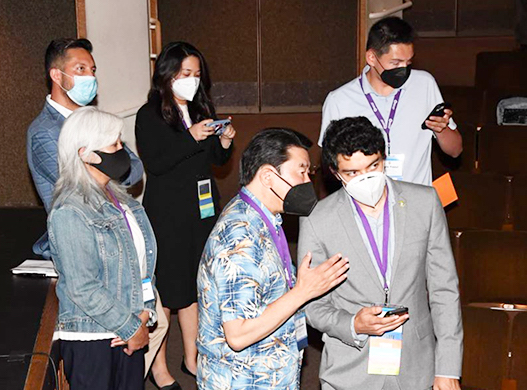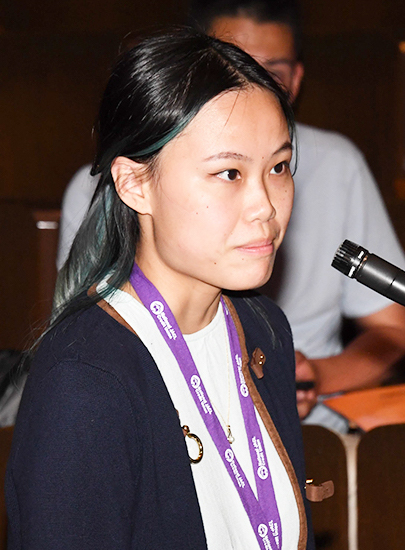By Annakai Hayakawa, Contributor
At the JACL National Council Meeting on July 20 during its recent National Convention in Little Tokyo, members overwhelmingly passed a resolution, R1, calling for increased support of transgender and nonbinary people.
The resolution states JACL National will offer all-gender bathrooms and lodging at events. This has been done before with success, said Vinicius Taguchi, president of the Twin Cities chapter and one of the resolution’s authors. A simple adjustment can be made to already-existing bathrooms, such as pasting a “Gender Neutral” sign over the sign for a gender-specific bathroom during the duration of an event or conference, he added.

R1 authors Josh Kaizuka and Vinicius Taguchi at the NC meeting. (Photo: Kris Ikejiri)
For Zara Espinoza, a member of the Twin Cities chapter and Young Professional Caucus officer of the Midwest District Council who spoke in support of the resolution, R1 gets at the core of the JACL’s mission to fight for civil and human rights of Japanese Americans and all others who are victimized by injustice and bigotry.
“It goes beyond bathrooms — it’s about how we are treating each other with dignity in our humanity,” Espinoza said. “Sometimes I have to remind people in power of the exclusionary messages they are sending when necessary accessibility accommodations are not provided. As Japanese Americans, we should be able to understand why it’s important to be supported and treated as fully human.”
“We can’t say we welcome our transgender and nonbinary members but say they must go somewhere else when nature calls or when they need to sleep,” said Michelle Huey of the Florin-Sacramento chapter. “We can’t say that we are a civil rights organization, but only when it is convenient.”
Huey’s opening statement kicked off a discussion of the resolution before the vote. She co-authored R1 with members from the Berkeley, San Jose and Twin Cities chapters along with the JACL National Youth/Student Council and Northern California-Western Nevada-Pacific District Youth Board.
“Having close friends who are queer and trans, it just felt like the right thing to focus on now,” said Josh Kaizuka, one of the resolution’s authors from the Florin-Sacramento chapter.
The resolution was also a response to the rise of anti-LGBTQIA+ legislation across the country, Taguchi said. A total of 492 anti-LGBTQIA+ state bills were proposed in the 2023 legislative session, according to the ACLU — many of them targeting trans and nonbinary people. Of that total, 78 have already been passed into law, including in Arkansas, North Dakota and Utah.
In Florida, where four anti-LGBTQIA+ bills have already been passed into law, domestic violence centers and bathrooms must now accept only those whose gender assigned at birth matches the facility’s signage. Trans people are prohibited from participating in sports, and sex-reassignment surgery and health-care procedures for transition are banned. Schools must also notify parents if a student’s gender expression does not match their sex assigned at birth.
Some of the resolution’s authors originally joined forces in 2020 after the police murders of George Floyd and Breonna Taylor, writing a resolution to affirm the JACL’s support for Black communities and Black Japanese Americans. The authors enjoyed working together, Taguchi said, and decided to team up again on the latest resolution.
In addition to offering gender-neutral bathrooms and hotel rooms, the resolution urges the JACL to create more educational opportunities for its members on topics like sexuality, gender identity and challenges faced by transgender and nonbinary people. It also calls for the inclusion of trans and nonbinary members in decision-making on policies impacting LGBTQIA+ communities.
Making all members of the JACL feel represented was key. “There are many Japanese Americans who are trans and nonbinary,” Taguchi said. “It is the JACL’s responsibility to acknowledge them and do what it takes for them to feel just as much a part of the organization.”
Lastly, the resolution summons the JACL to take action beyond its membership and advocate for legislation and funding in support of trans and nonbinary people’s well-being.

EDC NY/SC Rep. Sarah “Remi” Kageyama advocates for R1. (Photo: Kris Ikejiri)
“I have friends who can’t go home, who can’t be with family, because of the new anti-trans legislation popping up in their states,” said Sarah “Remy” Kageyama, Eastern District Council representative on JACL’s NY/SC, who is nonbinary. When, during the council meeting the EDC proposed an amendment to the bill, Kageyama delivered a speech to the room in favor of passing the resolution. “To say that we are not experts, that we should not be guaranteed a say on issues that affect our lives so profoundly, is an outrage,” they said.
JACL members of all ages were in support of the resolution. “Passing the resolution is a call to action to all chapters to implement the same standards to make our nonbinary and transgender colleagues feel welcome and comfortable,” said former Congressman Mike Honda of the San Jose chapter. While in Washington, D.C., Honda helped found the Congressional Equality Caucus in 2008, with the goal of advancing LGBTQIA+ rights. The Caucus’ initial three members have grown to 192 members today.
The JACL must use the resolution to “leverage our economic power,” said Naoko Fujii of the San Jose chapter. She hopes the JACL and its network of fellow organizations join together to take action.
The next step is to “try to see how we can strategize, so the JACL rallies our allies to do a similar thing,” she added. “We need to use our national platform.”
This article was made possible by the Harry K. Honda Memorial Journalism Fund, which was established by JACL Redress Strategist Grant Ujifusa.



